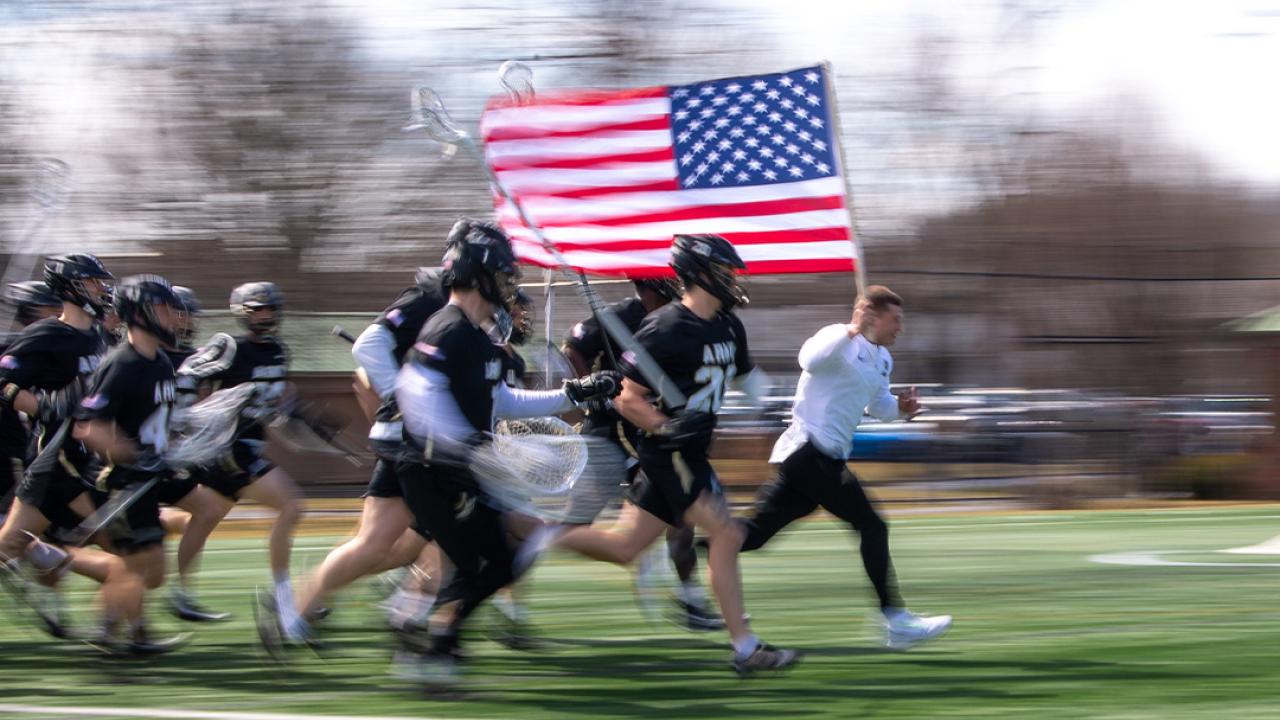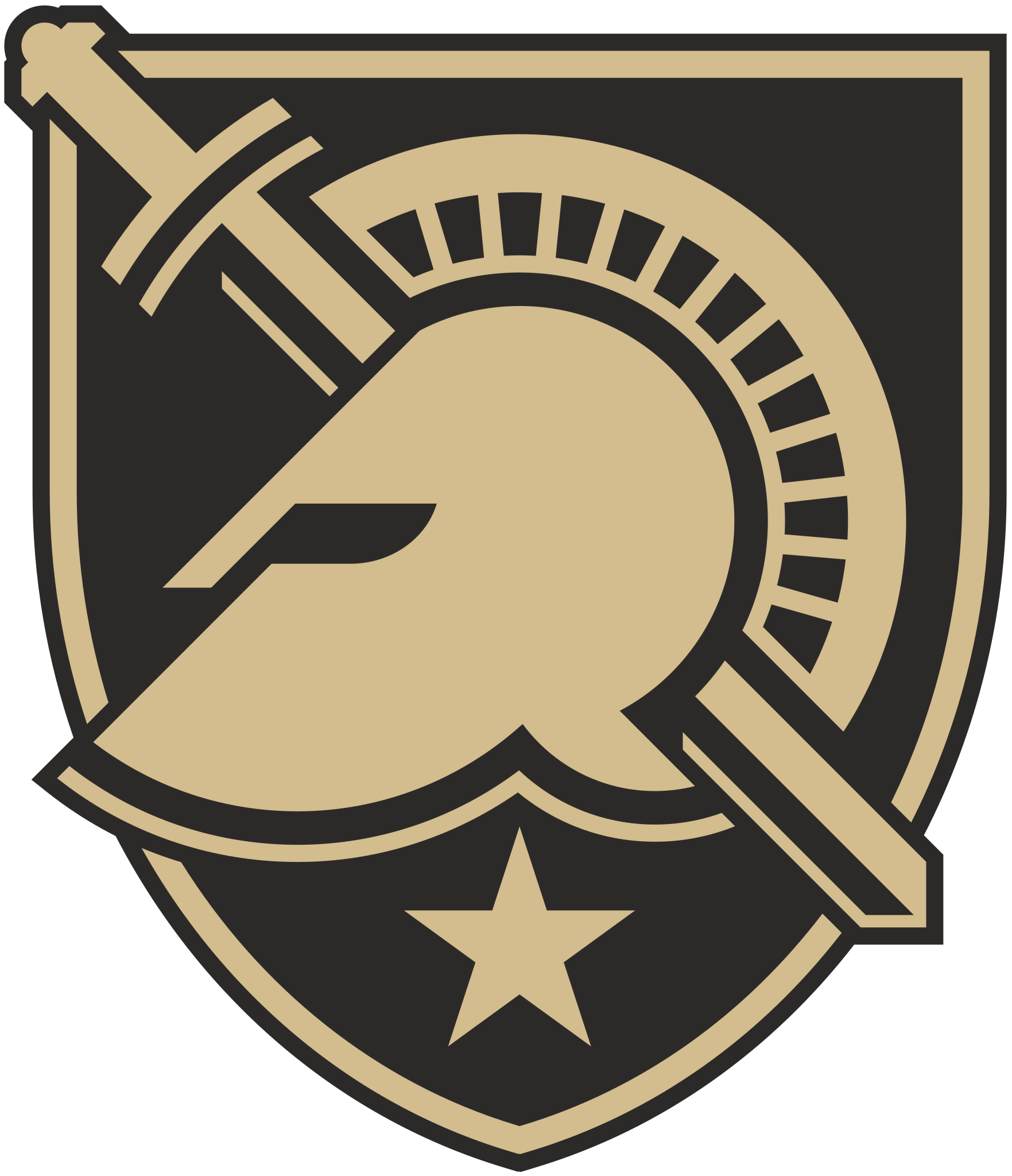
Injuries and All, Quinn Binney Wouldn't Trade West Point for Anything Else
IT WAS ALMOST THE WAY QUINN BINNEY imagined it would be when he was growing up.
He knew earlier than most he would graduate from West Point, the connections to the service academy already binding multiple generations of his family. By the time he was 13, he had plastered the words “Beat Navy” in duct tape on the weights in the garage of the family home in Houston.
Binney found his athletic calling in lacrosse, becoming so respected a teammate that Army coach Joe Alberici considered it a foregone conclusion the defensive midfielder would be a captain his senior year.
The highlight of any Army season — whether the Black Knights finish below .500 or play in the NCAA tournament quarterfinals, as they will Sunday against fifth-seeded Penn State in Annapolis, Md. — is the annual regular-season game against Navy. Only one senior is selected to run the flag onto the field.
“It’s arguably the best moment as an Army lacrosse player,” Binney said. “You work for four years, and to have those 62 guys in the white, black and gold standing behind you as you run the flag out and lead your team into the game, it’s the best moment you can ask for. As you’re running out to the 50-yard line, you never want the moment to end. You just want to run forever.”
All of it came to pass for Binney: The appointment to West Point, the lacrosse captaincy, even the charge onto the field before last month’s victory at Navy. The latter also came after Binney’s fourth anterior cruciate ligament tear since high school, a string of injuries that contributed to limiting his college career to eight games.
Correction: It limited his on-field contributions to eight games. His work in every other facet of the program? Well, where to begin?
Put it this way: The Black Knights (13-3) believe a big reason they’ve won their first Patriot League title in four years and won an NCAA tournament game for the first time since 2010 is because of a captain who was lost for the season in the chill of a West Point winter.
“After that injury, the role he took on as a leader off the field and in the locker room was so special because we had so many young players this year, a lot of question marks behind our team,” junior attackman Reese Burek said. “Just his presence, his calming character, how he displays himself in the locker room, everything. He was so important to where we are now.”
IMMEDIATELY, BINNEY KNEW.
Call it the curse of experience. He tore the ACL in his left knee while playing football in high school. He lost his senior high school season of lacrosse when he injured his right knee. (“My high school actually ended up winning the state championship that year, so I kind of assumed the role that I have now, kind of like a coach that year,” Binney said. “So, history really does repeat itself sometimes.”)
He was already headed to Army at that point, with a one-year stop at the academy’s prep school. He tore the right ACL as a freshman in 2020, then had a pair of healthy seasons.
He just didn’t play much. Matt Horace and James Pryor were four-year mainstays in the defensive midfield. Liam Davenport and Doug Jones both earned a heavy workload for three years. All were seniors in 2022, part of a massive 19-player graduating class.
This year, then, would be different. Already one of three team captains (along with Andrew Kelly and Jacob Morin), Binney’s opportunity to craft a legacy in meaningful games had finally come — at least until that day in the preseason.
“You’d be surprised how much it doesn’t actually hurt. It hurts a lot more mentally than it does physically,” Binney said. “After the first one, the other three I’ve known right away. It’s definitely tough. It takes a toll on your mind more than you think. You’d think you’d get better at it with experience, but it’s really not the case. It gets harder each time.”
Yet there was some mental fortitude built in because of the past. In the month or so after he was injured as a freshman, it was difficult for him to come and just watch practice. He would see someone make a cut and a chill would run down his spine.
Meetings with a sports psychiatrist helped him realize he was suffering from injury anxiety, something he had never heard of at the time.
“If I would have been going through that this year, it would have taken a toll on the team,” Binney said. “Being able to stay mentally strong through this one, from the lessons I learned from the third one definitely helped me assume that leadership role and be the captain the team needed me to be.”
Soon after his latest injury, Binney talked with his fellow captains, other seniors and past captains he held in high regard. The message was universal: The Black Knights still needed him.
Alberici offered similar sentiments when he spoke with Binney in Army’s locker room after exam results confirmed what Binney already knew.
“I just remember I didn’t have the best words,” Alberici said. “It was just the two of us sitting side by side. Tears were flowing from both of us and just had my arm around him and let him know, 'We still need your leadership,’ and it didn’t take him more than a day to immediately start to put his thoughts on the team, and since that time, he’s just poured into our players and our defensive middies.”
BINNEY’S GRANDFATHER IS A 1964 WEST POINT GRADUATE. An uncle was in the class of 1976. His father, Geoff, played football for the Black Knights, wore the same No. 5 that Quinn would don a few decades later and graduated in 1991. His brother Connor was a sprint football player who was part of the 2020 graduating class and is now a field artillery officer.
Suffice to say, he was geared toward becoming a cadet earlier than most.
“That’s why I came to West Point; lacrosse was just a really good side effect,” Binney said. “I knew I was going to go to West Point since I was a young teenager. My dad kind of raised me with the ‘Beat Navy’ mentality. It’s written all over the house. … I was born to play against Navy, to beat Navy and to do more. That, ‘Beat Navy, but everybody else, too’ mentality, I was raised on it.”
He had already made an impression in his first three seasons. Alberici said Binney, a nuclear engineering major, had tutored several teammates through physics classes. It wasn’t as if the captaincy was the start of his leadership within the program.
Unlike the large class of a year earlier, these Black Knights have only six seniors. It placed a greater onus on all of them to be pivotal figures, particularly with their respective units.
And while Alberici urged Binney to give others the chance to lead, it was also clear Binney would be especially prominent in the fall.
“Quinn was always that first voice that you heard,” Burek said. “Pre-practice, Quinn would say something in the huddle just to get us going for a game four months down the road. His voice was very loud, and when he spoke, he had everybody’s attention. That’s the leader he was. When he spoke, everyone was listening because what he was saying was beneficial to the team.”
After the preseason injury, Binney remained a constant presence. Many of the more subtle skills required to help guide a team — things like knowing who to speak to at the right time and exactly how to speak to them — have proven invaluable.
“Just from a lacrosse standpoint, he knows the game plan, he knows what we want to do,” Alberici said. “He’s picking up on things myself and some of the other coaches aren’t, and he’s pulling guys aside. It’s that way every day. It’s not just, ‘When I’m feeling good.’ He’s out there every day. He’ll do his rehab and then he’s out there. It’s like having a fifth coach.”
As an inspirational figure, Binney was arguably at his best in Army’s last trip to Annapolis. Alberici typically draws up a list of seniors to run the flag onto the field before the season but doesn’t inform a player of the honor until just minutes beforehand. In a normal year, a player only has one chance.
But this wasn’t a normal year. The gig rotated among the six seniors this spring, and Alberici knew early who the perfect man would be to handle the job for the Navy game.
So, as he and Binney sat in the locker room after the MRI results came back, the coach said, “Just make sure you can run in April for that Navy game,” just two months plus a week after surgery.
“I was thinking about, ‘What if I get hurt on the way out on national TV? What if I fall down?’” Binney said. “It ended up working out. I ended up getting to do it on the biggest stage and against the team I was born to play against. My family raised me on that game. That’s what I told the guys after I ran the flag out. To be able to communicate that to my teammates was such a special moment for me.”
It was the same for teammates, who scored three goals in a little more than four minutes to open the game and had little trouble securing an 11-6 victory.
“I had chills just to see that,” Burek said. “We dream about that as Army lacrosse players. That’s one of the goals, being a senior and getting to carry out that flag. Just to see him two, three months post-op running out the flag, light jog, whatever he was doing, having his family up in the stands, that was a surreal moment. It kind of captured everything he’s worked for and worked toward as an Army lacrosse player.”
There is more to come for Binney after graduation next week. He applied for and was selected by the MIT Lincoln Laboratory Military Fellowship and will spend the next two years doing research while also earning a master’s degree in engineering management. In 2025, he will begin his career as a field artillery officer and will be stationed at Schofield Barracks in Hawaii.
The camaraderie of the lacrosse program, the West Point degree, the future assignment in paradise … it’s almost as if it’s how Binney drew it up. And while he would like to add one immediate post-graduation itinerary item — a trip to Philadelphia for the NCAA semifinals — he’s had a captaincy that proved fulfilling both for himself and the Black Knights’ entire program.
“It truly wasn’t at all what I expected with the injuries, but it’s been [great] in every way with the relationships, the leadership training you get from Coach Alberici,” Binney said. “It’s unlike any other place. Being a captain has prepared me so much for my future, and I wouldn’t trade it for anything, injuries or not.”
Patrick Stevens
Patrick Stevens has covered college sports for 25 years. His work also appears in The Washington Post, Blue Ribbon College Basketball Yearbook and other outlets. He's provided coverage of Division I men's lacrosse to USA Lacrosse Magazine since 2010.

Related Articles





